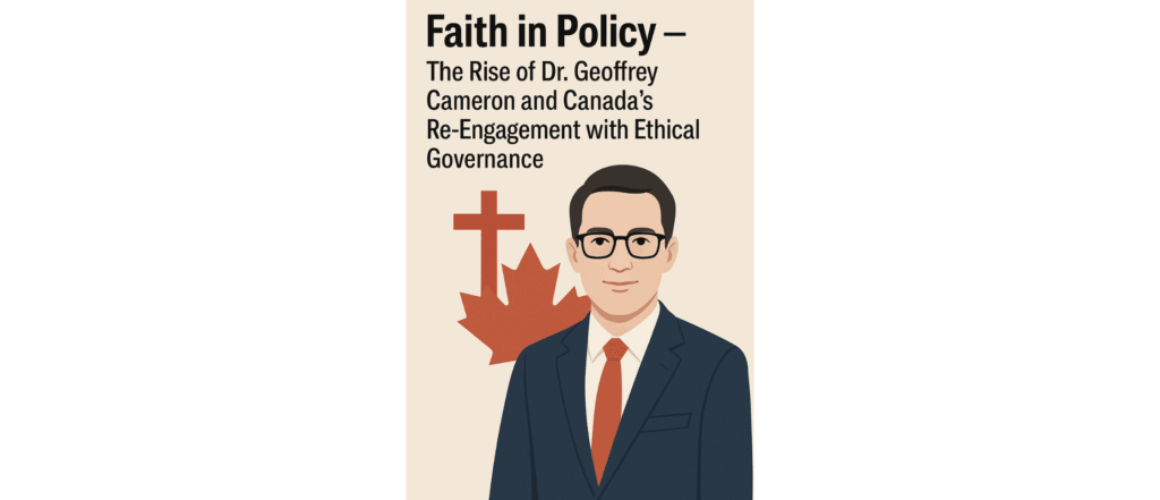Faith in Policy – The Rise of Dr. Geoffrey Cameron and Canada’s Re-Engagement with Ethical Governance
The awarding of the King Charles III Coronation Medal to Dr. Geoffrey Cameron, a political scientist and policy advisor, may seem at first glance like a ceremonial nod to academic accomplishment. But within Canada’s shifting political landscape, it signals something much more consequential: a renewed respect for the role of ethical reasoning, community values, and religious insight in shaping modern governance.
In an era increasingly dominated by technocracy, big data, and polarization, Cameron represents a quiet but growing movement advocating for the reintroduction of moral and spiritual frameworks into public debate — without crossing the line into dogma. A Baha’i scholar and policy thinker, his work has championed the idea that pluralism isn’t just a demographic fact — it can be a policymaking strength.
This notion is beginning to gain traction at the federal level.
A New Type of Policy Advisor
Dr. Cameron currently advises on civic integration, refugee sponsorship models, and interfaith dialogue within Canada’s multicultural governance structures. His research, published widely across journals and think tanks, argues that faith-based institutions often outperform government programs in areas like refugee resettlement, elder care, and food insecurity — not because of their resources, but because of their rootedness in community trust.
Carney’s government, always mindful of data and outcome-based analysis, has taken notice. A new “Faith in Service” working group was quietly established earlier this year under the Ministry of Families, Children, and Social Development. Its mandate: to assess how faith-based nonprofits contribute to national resilience, particularly in underserved communities and crisis recovery.
Cameron’s ideas — and his credibility as both a political scientist and religious scholar — have positioned him as a bridge-builder between public secularism and private conviction.
Moving Beyond Cultural Tokenism
For decades, Canadian multiculturalism has been lauded as a model of diversity. But critics have argued that its practical implementation too often stops at “celebratory inclusion” — festivals, language access, and holiday recognitions — without truly engaging with the ethical and philosophical richness that diverse traditions bring to the national table.
Cameron challenges this. In his speeches and research, he insists that diversity should not just be accommodated — it should inform how we think about justice, economics, and human dignity. For example, during a panel on housing policy, he argued that spiritual teachings about stewardship, humility, and mutual obligation could help move Canada beyond market-based solutions to housing insecurity.
This has struck a chord among a new generation of policymakers who are disillusioned with ideological binaries. In fact, a recent University of Toronto policy fellowship focused on “Moral Imagination in Politics” was inspired by his 2021 book, Faith and Public Life in Canada: Bridging the Sacred and the Civic.
Political Caution vs. Quiet Progress
Not everyone is ready to embrace this shift. Secularist groups have raised alarms about the potential erosion of the boundary between church and state. Conservative critics worry it could be a means for progressive moralism to infiltrate policy under the guise of “inclusive spirituality.”
But Carney’s government has been cautious. The shift is not toward religion in politics — it is toward ethics in governance. In a society where trust in institutions is declining, leaders are exploring where they might find new wells of moral legitimacy. Faith communities, once seen as retrograde or peripheral, are reemerging as civic partners — especially in domains where public trust is essential.
The Long Game: Civic Renewal Through Moral Anchoring
Cameron’s rise is not about making Canada a more religious country. It’s about reminding a secular state that its moral compass can be nourished by voices outside the algorithm — by people rooted in centuries of ethical thinking and community practice.
In many ways, it’s a return to something old: the idea that governance is not just administration, but stewardship. That public service is not just a job, but a vocation. And that policy, at its best, is a reflection of who we aspire to be — not just how we manage what is.
As polarization deepens across the globe, Canada may be quietly testing a new hypothesis: that the path to civic renewal runs through moral humility, cross-cultural respect, and a rekindled sense of shared purpose. And Dr. Geoffrey Cameron may just be one of its architects.
